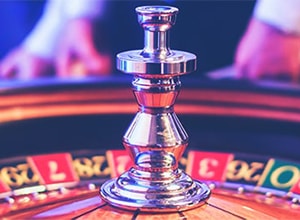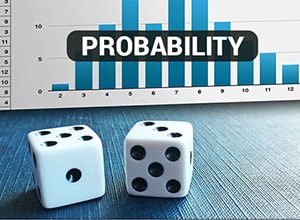Roulette Is All About Maths
Estimating what house edge one is battling is critical, especially when it comes to choosing which roulette variation to play. Successful roulette players are also capable of evaluating how likely it is to win with a given roulette bet through the use of simple probability formulas. To extract maximum value out of your play, it is essential to comprehend how often you can expect to win with your bets and how big a house edge you must overcome at the table.
Knowing how likely an outcome is helps them make informed decisions when choosing which type of bets to place at the roulette table. In this detailed guide, you will find a clear list of all the odds you need to know for various bets, and the house advantage for different games. Any successful roulette player will understand these concepts clearly, and use them to manage money efficiently and work out what return on investment they will be looking at.
- Up to $3000 welcome bonus upon first three deposits
- Well-established US-friendly brand
- Top quality casino games
- Extra bonuses for Bitcoin depositors
 ACCEPTED
ACCEPTED
PLAYERS FROM UNITED STATES: OHIO ARE ACCEPTED AT THIS CASINO
- Well-established brand
- Prompt payments
- 24/7 customer support
- Wide range of casino games
 ACCEPTED
ACCEPTED
PLAYERS FROM UNITED STATES: OHIO ARE ACCEPTED AT THIS CASINO
- Up to $300 bonus upon first three deposits
- Great loyalty program
- Superb loyalty program
- Great selection of table games
 ACCEPTED
ACCEPTED
PLAYERS FROM UNITED STATES: OHIO ARE ACCEPTED AT THIS CASINO
- Accepts players from all over the world
- Great daily bonuses
- Fair bonus rules and requirements
- Award-winning customer care team
 ACCEPTED
ACCEPTED
PLAYERS FROM UNITED STATES: OHIO ARE ACCEPTED AT THIS CASINO
The House Edge
 For those of you who don’t know what this means, this is the advantage the casino has and different games have different house advantages. This advantage, or house edge as it is commonly called, resembles a commission the casino collects from all bets in order to keep operating the tables.
For those of you who don’t know what this means, this is the advantage the casino has and different games have different house advantages. This advantage, or house edge as it is commonly called, resembles a commission the casino collects from all bets in order to keep operating the tables.
The house edge is practically built into the payouts on winning bets. In some games of chance it varies depending on bet type, but in others like roulette, it largely remains constant no matter the wager. The only exception to this rule can be found on the American roulette tables, where the so-called Five-Number Bet on the cluster covering numbers 0, 00, 1, 2, and 3 comes with a monstrous advantage of 7.90% in favour of the house.
Where house edge is concerned, roulette is considered a mid-range casino game. What casino advantage players are facing largely depends on the variation and how many zero pockets there are on the spinning wheel. This is so, because the zero practically gives the house its advantage.
The presence of this tiny green pocket disrupts players’ chances of winning and reduces (albeit ever so slightly) the likelihood of collecting a payout with even-money propositions like red/black, for example. This is so, because all outside bets from this category are by default losers whenever the ball settles in the green pocket. In roulette, the zero is considered neither red nor black but it is not high/low or odd/even, either.
Still, the payouts the house awards correspond to what one would expect from a game of even chances. Outside bets on number properties would pay even money despite the fact the actual odds of winning are 18:19 (1.055 to 1) instead of 18:18 (1 to 1) as one would expect. Add a second zero pocket on the wheel and your chances of bagging a payout with an even-money proposition are further reduced to 18:20 (1.111 to 1).
The most popular type of roulette uses European rules, a game with a single zero. There are 18 red and 18 black numbers on the wheel, along with one green zero, giving a house edge of 1/37, or 2.70%. Without it, the even-money bets like those on red/black, odd/even, and high/low will be entirely 50/50 and the house edge will be 0%, but this one number means that every so often neither of the even-money wagers will pay out and the casino will take your bets.
- Straight Bet – Placing a bet on an individual number. Payout is 35:1.
- Split Bet – Placing a bet on two adjacent numbers. Payout is 17:1.
- Street Bet – Placing a bet on three numbers in a line. Payout is 11:1.
- Corner Bet – Placing a bet on four neighbouring numbers. Payout is 8:1.
- Six Line Bet – Placing a bet on six consecutive numbers. Payout is 5:1.
- Columns Bet – Placing a bet on the 1st, 2nd or 3rd Columns. Payout is 2:1.
- Dozens Bet – Placing a bet on the 1st, 2nd or 3rd Dozen. Payout is 2:1.
- High or Low Bet – Placing a bet on High or Low numbers. Payout is 1:1.
- Even or Odd Bet – Placing a bet on Odd or Even numbers. Payout is 1:1.
- Red or Black Bet – Placing a bet on Red or Black numbers. Payout is 1:1.
One of the benefits of roulette is its relatively low house edge compared to say slots (often 5% or more). There are plenty of variations of roulette available online, and many offer bonuses which can change the house edge, but there are three main types which you should know:
European Roulette: 2.70%
American Roulette: 5.26%
French Roulette where the La Partage and the En Prison rules apply: 1.35% (on even-money bets only).
To explain these briefly (see ‘roulette rules’ for more information), American roulette uses 2 zeros, so there is a 2/38 chance of a zero coming up, hence the doubled house edge at American tables. In many French variations of the popular game of chance, there are two additional rules concerning the even-money propositions, the En Prison and the La Partage. The La Partage rule means the casino will return half of the bet back to you if zero comes up.
The En Prison rule is often to be found at the roulette tables in landbased venues throughout Monaco or other European gambling hubs. Whenever En Prison is in force and zero hits, the croupier will place a tiny pawn-shaped marker next to the player’s chips. This is to indicate the money staked on even-money propositions is “imprisoned” for the next coup.
The player is then given a second chance to win with their even-money bet on the next spin. If the spin is successful, the player is paid at even odds as usual. If not, the croupier collects the entire losing bet that was “in prison”. This way, the house edge on single-zero wheels is further reduced from 2.70% to 1.35% when these two rules are at hand.
Always check if your preferred game offers these rules as they can make a big difference to your overall profits/losses. The bottom line is you should strive to play at single-zero tables. If you absolutely insist on playing the American variation, at least steer clear of making any Five-Number Bets – these rank rather high on the list of casino “sucker” bets.
Another way to explain the house edge would be to say it represents the percentage of money the house collects per every $100 wagered at the roulette table. Thus, the casino pockets $2.70 on average out of every $100 staked on a single-zero table and $5.26 for every $100 wagered in the double-zero variation.
This is precisely what renders roulette a negative expectation game – no matter what you do, you will always end up losing money over time because there is a mathematical discrepancy between the real chances of winning and the odds offered by the house on winning bets. Come to think about it, the proverb “Time is money” really does ring true in this case. The more time you spend at the roulette table, the more money you will end up losing because of the built-in casino advantage. There is no escaping the house edge in the long run in roulette or any other game of chance for that matter.
Roulette Betting Probabilities
 Many gambling rookies use the terms “probability” and “odds” interchangeably but in fact, it is important to differentiate between the two because they denote different concepts. Allow me to explain in brief what the difference between roulette odds and roulette probability is.
Many gambling rookies use the terms “probability” and “odds” interchangeably but in fact, it is important to differentiate between the two because they denote different concepts. Allow me to explain in brief what the difference between roulette odds and roulette probability is.
When we use the term “probability”, we refer to the likelihood of a given outcome occurring when compared to all possible outcomes. An example would be the simple toss of a coin in a game of head or tails where obviously there are two possible outcomes. Therefore, the chances of winning and losing are equal.
You can easily calculate what the probability of winning with heads is by using the following simple formula – number of ways to win /(number of ways to win + number ways to lose) or 1/(1+1) = ½ = 0.50. You then can multiply the result by 100 to express it in percentage form or 50% chance of heads occurring.
In other words, the probability of an event occuring can be calculated by dividing the number of desirable outcomes by the total of all possible outcomes. The same goes for roulette probability which is easy to calculate since there are only 37 (or 38 in the American version) possible outcomes that can occur on a single spin of the wheel.
Let’s back this up with an example. Imagine you are at a single-zero table and bet on black. What is the likelihood of winning with one such bet? Well, according to the formula it is 18/(18+19) = 18/37 = 0.4864 x 100= 48.64%. As you can see, the chances of you losing with your bet on black slightly exceed those of winning as they stand at 51.36% instead of 50%. The discrepancy is ever so small but you will inevitably pay $2.70 in fees out of every $100 staked in the course of time, no matter whether you win or lose. Check out the table below for the probability percentages of winning with the other types of bets in single and double-zero roulette variations.
| Type of Bet | Probability of Winning on a Single-Zero Wheel | Probability of Winning on a Double-Zero Wheel |
|---|---|---|
| Red/Black | 48.64% | 47.36% |
| Odd/Even | 48.64% | 47.36% |
| High/Low | 48.64% | 47.36% |
| Column | 32.43% | 31.57% |
| Dozen | 32.43% | 31.57% |
| Double Street | 16.21% | 15.79% |
| Five-Number Bet* | Not accepted at single-zero tables* | 13.15% |
| Corner | 10.81% | 10.52% |
| Street | 8.10% | 7.89% |
| Split | 5.40% | 5.26% |
| Straight-Up | 2.70% | 2.63% |
Distinguishing between True Odds and Casino Odds
 While at the roulette table, you are likely to hear experienced gamblers using the term “odds”. Some people even use it interchangeably instead of “probability” but the two terms differ mathematically as I would proceed to explain. Odds are different from probability in that they are used to express the correlation between the number of ways to win as opposed to the number of ways to lose with a bet.
While at the roulette table, you are likely to hear experienced gamblers using the term “odds”. Some people even use it interchangeably instead of “probability” but the two terms differ mathematically as I would proceed to explain. Odds are different from probability in that they are used to express the correlation between the number of ways to win as opposed to the number of ways to lose with a bet.
Odds can be presented in the form of vulgar fractions like 18/19 but often the “:” sign is used, like this 18:19, whereas probability is usually expressed as a percentage to denote the likelihood of a particular event occurring. Hence, you can determine what your true odds of winning are by dividing the number of ways to win by the number of ways to lose. So in the above example, I have practically given you your odds of succeeding with an even-money outside bet on a single-zero roulette wheel.
Confusion frequently results from the expression of the odds in reverse, in which case the vulgar fraction denotes the chances against winning with a particular bet. To proceed with the even-odds example, the odds against winning with one such outside bet would be 19/18 or 19:18. In other words, there are 19 losing numbers and 18 winning ones.
On True Odds and House Odds
Now would be the proper time to draw a line between true odds and house odds. It is important to be able to differentiate between the two because this difference is precisely where the house gets its edge from. The house is practically betting against its players hence the expression of the odds in reverse. The smaller your chances of winning, the higher the payout you earn, if successful, and vice versa.
Since we have already outlined the differences between odds and probability, let’s proceed by explaining how the house meets its profit margin from the roulette tables. On a single-zero wheel with a total of 37 pockets, there is only one way to win with a straight-up bet as opposed to 36 ways to lose. Thus, your true odds of winning are 1:36 while the true odds against success are 36:1. In an ideal world where there is no house advantage, the casino would be expected to pay you at a rate of 36:1 – you get 36 base betting units plus the single unit you have initially staked.
Unfortunately, a single glance at the payouts table would suffice for you to see you are getting less than what you have bargained for. Straight-up bets are paid out at house odds of 35:1, which is to say you get one unit less, one unit the house retains as a “fee” for servicing you and running the roulette table.
Similarly, even-money bets offer you true odds of 18:19 or expressed in reverse, 19:18(1.055 to 1) as there are only 18 winning numbers and 19 losing ones, factoring in the single-zero. The payout for a winning even-odds bet, however, is only 1:1 (as if the number of losing and winning numbers coincides) and clearly does not correspond to the actual odds against winning with this type of wager. The same applies to all other bet types in the game but there is nothing much to be done about it – the zero will always be there to hinder you on your way towards beating the Devil’s Wheel. That is the reason it was added in the first place.
| Type of Bet | True Odds Against Winning in Single-Zero Games | True Odds Against Winning in Double-Zero Games | House Odds/Payouts |
|---|---|---|---|
| Red/Black | 1.056 to 1 | 1.111 to 1 | 1 to 1 |
| Odd/Even | 1.056 to 1 | 1.111 to 1 | 1 to 1 |
| High/Low | 1.056 to 1 | 1.111 to 1 | 1 to 1 |
| Column | 2.083 to 1 | 2.167 to 1 | 2 to 1 |
| Dozen | 2.083 to 1 | 2.167 to 1 | 2 to 1 |
| Double Street | 5.167 to 1 | 5.33 to 1 | 5 to 1 |
| Five-Number Bet* | Not accepted at single-zero tables | 6.2 to 1 | 6 to 1 |
| Corner | 8.25 to 1 | 8.50 to 1 | 8 to 1 |
| Street | 11.334 to 1 | 11.667 to 1 | 11 to 1 |
| Split | 17.5 to 1 | 18 to 1 | 17 to 1 |
| Straight-Up | 36 to 1 | 37 to 1 | 35 to 1 |
On Choosing Your Bets in Roulette
There are lots of different bets you can make in roulette, and all have different true and house odds. These are very useful to know depending on your strategy, and while they can of course be worked out quite easily, below is a list of different bets to make things clearer. The table includes the true odds and the house odds in both the American and the European variations of the popular game of chance.
So, the even money bets like red or black offer the lowest payout, but have the greatest chance of coming up in your favour. Straight-up bets have a huge payout (a £10 bet will provide a profit of £350) but a much lower chance of coming up.
In the general run of things, the bigger the chances of winning with a given wager, the lower your payout will be. Casual players are often tempted to repeatedly bet on a single number, one they consider to be “lucky”. In the meantime, they neglect the possibility (and it does exist, I assure you) of draining their entire bankrolls while waiting for their “lucky” number to hit and recoup the losses they have suffered.
It might seem like a good idea to put a large amount of money on some of the higher payout bets like straight-ups or splits, but you could bet considerably more than what the profit will bring before it comes up, and quickly get through your bankroll. Betting on the smaller payout bets, however will certainly let you play a much longer game and can seem much more rewarding with wins coming by far more frequently, but your profit will be much smaller.
Sometimes it is best to play it safe and rely on consistent, albeit smaller profits by placing bets that cover as many numbers on the wheel as possible. To each their own, but whatever approach you decide to incorporate, make sure you avoid playing at the double-zero tables. The Five-Number Bet, in particular, should be off limits to any smart gambler. It carries an immense house edge of 7.90% while at the same offering you a laughable payout of 6 to 1 only whereas the mathematically correct payout ratio for this bet should be 6.2 to 1.
Conclusion
The world of odds and probabilities is full of intricacies, but these two concepts are important to understand when you engage in gambling, be it at the roulette or at the craps table. While gaining a proper understanding of how odds and probabilities work will hardly endow you with the powers of divination, it still allows you to assess the likelihood of winning with a certain bet type. This, on its own, is the surest way to make better-informed decisions when playing a game based solely on chance.
The question is then, what types of bets should you place? This is a very important decision to make and there are lots of strategies and systems available to help you. I recommend reading through some of these on the ‘systems and strategies’ page.




